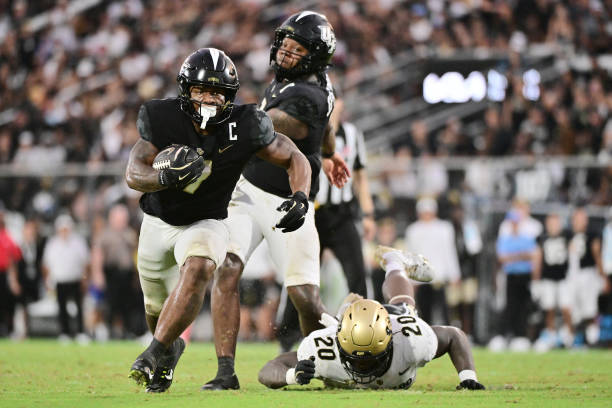
Getty
ORLANDO, FLORIDA – SEPTEMBER 28: RJ Harvey #7 of the UCF Knights rushes the ball in the second half against the Colorado Buffaloes at FBC Mortgage Stadium on September 28, 2024 in Orlando, Florida. (Photo by Julio Aguilar/Getty Images)

Getty
ORLANDO, FLORIDA – SEPTEMBER 28: RJ Harvey #7 of the UCF Knights rushes the ball in the second half against the Colorado Buffaloes at FBC Mortgage Stadium on September 28, 2024 in Orlando, Florida. (Photo by Julio Aguilar/Getty Images)
Just because UCF joined the Big 12 in 2024 doesn’t mean everything instantly turned to gold. Under the hood? That engine’s still revving up—and it’s burning through dollars at a wild clip. Behind the scenes, the dollars-and-cents side of UCF’s rise to the Power Conference world just got a cold splash of reality. Athletic Director Terry Mohajir’s recent admission is less of a flex and more of a confession: the Big 12 money is great, but it still isn’t enough.
Watch What’s Trending Now!
In their first year in the conference, the Knights pulled in between $21 and $29 million, according to the latest tax filings from the league. Not bad considering they got just $9.53 million from the AAC the year prior. But that check comes with some fine print. UCF is still paying off an $18 million exit fee to the AAC—the cost of doing business when you level up. This financial flip isn’t just about more cash; it’s about matching the pace of programs with way deeper pockets and decades-long donor pipelines.
Mohajir laid it all out when he joined the Sons of UCF podcast on June 20. Host Trace Trylko didn’t sugarcoat it either. “What was the athletics budget the day you arrived on campus?” he asked.
ADVERTISEMENT
“$59 million,” Mohajir responded. Trace kept it rolling. “And what’s the budget now?” Terry didn’t miss a beat: “$121 million.”
That’s a real-world doubling of the budget—a $62 million climb that mirrors UCF’s rise in college football’s food chain. And yes, the Big 12 move was the catalyst. “Becoming full-share members this year in the Big 12, it’s a $29 million lift,” Mohajir said. That’s the key word here: lift. Because while UCF is rising, it’s clear they’re still reaching for the summit.
So when Trace pointed out that some fans see UCF as “poor” compared to its Big 12 neighbors, Mohajir didn’t back down—but he did tweak the framing. “I wouldn’t say that [poor]. I would say resources come in a lot of different forms, and we have a lot of resources that other schools in our league don’t have. I would say we are behind in facilities and some of the history and the donors.” UCF’s got some gaps to close, but they’re closing them.
ADVERTISEMENT
View this post on Instagram
Mohajir pointed out that UCF is punching above its weight in recruiting. “But I would say we’re still not where the rest of the league is. You can look at the numbers—who we’re recruiting against. We’re not just recruiting against Iowa State, Kansas, and Kansas State…We’re recruiting against Georgia, Alabama, all the Big Ten schools that come into Atlanta and recruit. I don’t look at it as poor. I just think that we’re emerging.”
ADVERTISEMENT
$121 million is a positive step, but Mohajir admits it’s still not enough to match some Big 12 peers (like Kansas at ~$200M) or national powers (e.g., Georgia, Alabama). So the number is positive progress, but there’s still work to do. That’s the reality check. The Power 4 dream? It’s pricey. But UCF’s in it for the long haul, even if the $121 million still puts them behind the Kansases and far from the Alabamas of the world.
UCF Knight football’s 2025 season: preview, squad check, and total wins
The biggest story in Orlando isn’t the money—it’s the man back in charge. Scott Frost is home. Gus Malzahn is off to call plays for Mike Norvell’s offense at Tallahassee. Frost. The same coach who took UCF to a perfect season back in 2017 before heading off to Nebraska, where things… well, didn’t quite pan out. But hey, sometimes the sequel hits harder, right?
ADVERTISEMENT
Frost inherits a program in transition, and the biggest puzzle piece might be the quarterback room. It’s a three-way battle between Tayven Jackson (formerly Indiana), Jacurri Brown (the returner with two rough starts), and Cam Fancher, who’s got the most starting reps under his belt thanks to time at Florida Atlantic and Marshall. The QB1 spot in Orlando is up for grabs, and you can feel the tension.
Behind whoever takes the snaps will be a running back duo worth watching. Myles Montgomery is set to be the starter after learning the ropes behind RJ Harvey. But don’t sleep on Jaden Nixon—the Western Michigan transfer almost cracked 1,000 yards last year and brings speed, burst, and serious competition to the backfield. Wide receiver? That’s the wild card. Most of UCF’s 2024 pass-catchers are gone, whether through the portal or graduation. So, the staff had to bring in new talent. DJ Black (a DII beast), Duane Thomas Jr. (track speed), and freshman standout Waden Charles have already turned heads in spring.
Top Stories
Phil Mickelson Has the Last Laugh After PGA Tour Protege Rejected His LIV Golf Offer

‘Disturbing’ Fake Messages Force Amanda Balionis to Issue Urgent Warning

Scottie Scheffler Takes Side With Blunt 12-Word Message Days After Brooks Koepka’s Return Announcement

“Hard Being a Black Woman”: Coco Gauff on Donald Trump’s Administration

WATCH: Carlos Alcaraz Lashes Out at His Coach and Brother in Tense Win at the Australian Open

Fired Sean McDermott Doesn’t Hold Back in Final Message to Bills Mafia As Locker Room ‘Sickened’ by HC’s Removal

On defense, the edge is the edge—literally. Malachi Lawrence and Nyjalik Kelly return after combining for 10.5 sacks. And whispers around the building say Pitt transfer Sincere Edwards might be next in line to pop. The linebacker room’s been revamped through the portal, featuring Virginia Tech’s Keli Lawson, Oklahoma’s Lewis Carter, and FCS tackling machine Cole Kozlowski (133 takedowns last season at Colgate). The secondary should have some bite too, with FAU transfer Phillip Dunnam patrolling deep and Braeden Marshall anchoring the nickel.
ADVERTISEMENT
Vegas set the Knights’ win total at 6.5—and the sharps are leaning under. Models like ELO suggest a 5–7 finish. So yeah, expectations are meh. But fans? They’re hoping for a bowl berth. Anything over 7 wins and Frost is printing goodwill like NIL deals in Texas. A quick rebuild? It looks that way.
ADVERTISEMENT
ADVERTISEMENT
ADVERTISEMENT



